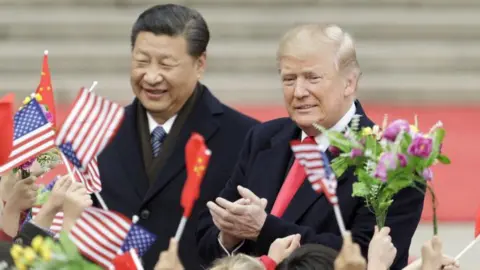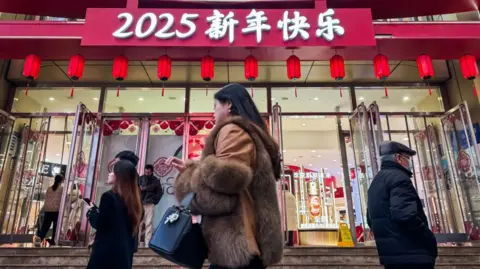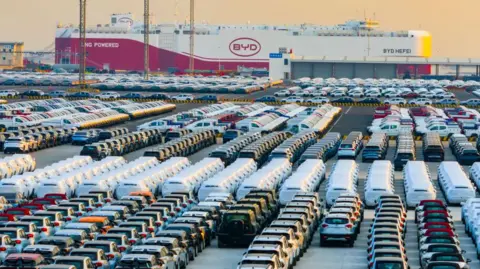[ad_1]
 Getty Photos
Getty PhotosChina’s financial system rebounded within the final three months of final yr, permitting the federal government to fulfill its development goal of 5% in 2024, Beijing introduced on Friday.
But it surely is likely one of the slowest charges of development in many years because the world’s second largest financial system struggles to shake off a protracted property disaster, excessive native authorities debt and youth unemployment.
The top of the nation’s statistics bureau stated China’s financial achievements in 2024 had been “arduous gained,” after the federal government launched a slew of stimulus measures late final yr.
Beijing has hardly ever missed its development targets previously.
Specialists had broadly predicted this price of development. The World Financial institution stated decrease borrowing prices and rising exports would imply China may obtain annual development of 4.9%.
Traders, nevertheless, are bracing themselves: the specter of President-elect Donald Trump’s tariffs on $500bn (£409bn) price of Chinese language items looms massive.
But that’s not all that stands in the way in which of China attaining its development targets subsequent yr.
Enterprise and shopper confidence is low, and the Chinese language yuan will proceed to weaken as Beijing cuts rates of interest in a bid to spice up development.
Listed below are three explanation why Xi has larger challenges than Trump’s tariffs:
1. Tariffs are already hurting Chinese language exports
There’s a rising refrain of warnings that China’s financial system will sluggish in 2025. One main driving issue of final yr’s development is now in danger: exports.
China has relied on manufacturing to assist exit the slowdown – so, it has been exporting a document variety of electrical automobiles, 3D printers and industrial robots.
The US, Canada and the European Union have accused China of constructing too many items and imposed tariffs on Chinese language imports to guard home jobs and companies.
Specialists say Chinese language exporters might now deal with different components of the world. However these nations are more likely to be in rising markets, which do not have the identical ranges of demand as North America and Europe.
That would influence Chinese language companies which are hoping to broaden, in flip hitting suppliers of power and uncooked supplies.
Xi needs to remodel China from the world’s manufacturing facility for affordable items right into a high-tech powerhouse by 2035 however it’s unclear how manufacturing can proceed to be such an enormous development driver within the face of rising tariffs.
2. Persons are simply not spending sufficient
In China, family wealth is essentially invested within the property market. Earlier than the actual property disaster, it accounted for nearly a 3rd of China’s financial system – using tens of millions of individuals, from builders and builders to cement producers and inside designers.
Beijing has applied a slew of insurance policies to stabilise the property market and the the monetary markets watchdog, the China Securities Regulatory Fee (CSRC), has stated it is going to vigorously help reforms.
However there are nonetheless too many empty houses and business properties, and that oversupply continues to drive down costs.
 Getty Photos
Getty PhotosThe property market droop is anticipated to backside out this yr, however Wall Avenue banking large Goldman Sachs says the downturn shall be a “multi-year drag” on China’s financial development.
It is already hit spending arduous – within the final three months of 2024, family consumption contributed simply 29% to China’s financial exercise, down from 59% earlier than the pandemic.
That is likely one of the causes Beijing has stepped up exports. It needs to assist offset sluggish home spending on new automobiles, luxurious objects and virtually every part else.
The federal government has even launched programmes like shopper items trade-ins, the place folks can change their washing machines, microwaves and rice cookers.
However specialists wonder if these sorts of measures alone are enough with out addressing deeper points within the financial system.
They are saying folks will want more cash of their pockets earlier than pre-Covid ranges for spending return.
“China must carry again the animal spirit of the inhabitants and we’re nonetheless removed from that,” stated Shuang Ding, Chief Economist for Larger China and North Asia at Commonplace Chartered Financial institution.
“If the non-public sector begins to speculate and innovate that would enhance earnings and the job outlook, and other people may have extra confidence to devour.”
Steep public debt and unemployment have additionally affected financial savings and spending.
Official figures counsel the youth jobless price stays excessive in comparison with earlier than the pandemic, and that wage rises have stalled.
3. Companies should not flocking to China like they used to
President Xi has promised to put money into the cutting-edge industries that the federal government calls “new productive forces”.
Till now, that has helped China turn out to be a pacesetter in items like renewable power merchandise similar to photo voltaic panels and electrical car batteries.
Final yr, China additionally overtook Japan because the world’s greatest automotive exporter.
 Getty Photos
Getty PhotosHowever the lacklustre financial image, uncertainty over tariffs and different geopolitical uncertainties imply the urge for food of overseas companies for funding in China is subdued.
It isn’t about overseas or home funding – it is that companies do not see a vibrant future, stated Stephanie Leung from wealth administration platform StashAway.
“They wish to see a extra diversified set of buyers coming in.”
For all of those causes, specialists consider the measures to help the financial system will solely partially alleviate the influence of potential new US tariffs.
Beijing should both undertake huge, daring measures or settle for that the financial system is just not going to develop so quick, Goldman Sachs’ Chief China Economist Hui Shan wrote in a latest report, including: “We count on them to decide on the previous.”
“China must stabilise property markets and create enough jobs to make sure social stability,” Mr Ding from Commonplace Chartered Financial institution stated.
In accordance with researcher China Dissent Monitor, there have been greater than 900 protests in China between June and September 2024 led by staff and property house owners – 27% greater than the identical interval a yr earlier.
These kind of social strains because of financial grievances and an erosion of wealth shall be a priority for the Chinese language Communist Social gathering.
In spite of everything, explosive development turned China into a worldwide energy, and the promise of elevated prosperity has largely helped its leaders hold a good lid on dissent.
[ad_2]
[ad_1]
#China #Donald #Trumps #tariffs #countrys #drawback
[ad_2]
, 2025-01-17 03:10:00


